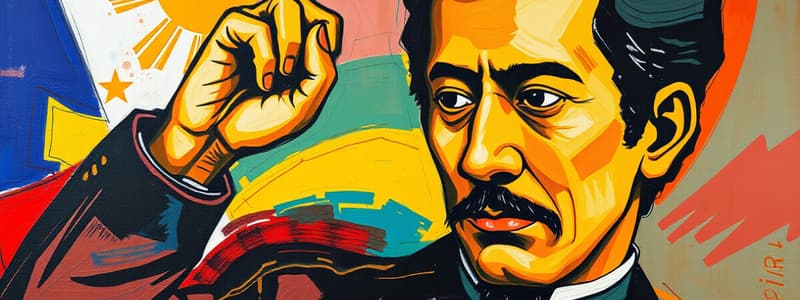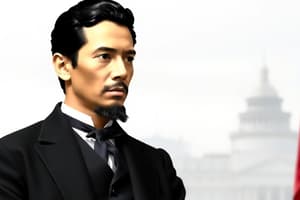Podcast
Questions and Answers
What was a primary reason for the enactment of the Rizal Law in 1956?
What was a primary reason for the enactment of the Rizal Law in 1956?
- To promote religious studies in colleges
- To mandate the study of José Rizal's works (correct)
- To provide financial support for universities
- To abolish colonial education systems
Which provision was included in the final bill of the Rizal Law?
Which provision was included in the final bill of the Rizal Law?
- Teachers must be certified in Rizal's history
- Catholic students can refuse to read Rizal's works (correct)
- All students must read Rizal's works
- Rizal's novels must be taught in a specific order
What was one of the goals of the Rizal Law?
What was one of the goals of the Rizal Law?
- To instill ideals of freedom and nationalism in youth (correct)
- To enhance foreign studies in universities
- To promote loyalty to the Catholic Church
- To reduce the teaching of Philippine history
What was a common opposition to the Rizal Law among the clergy?
What was a common opposition to the Rizal Law among the clergy?
Which individual sponsored the Rizal Law in the Senate?
Which individual sponsored the Rizal Law in the Senate?
What was one consequence of the absence of academic freedom in the educational system during the Spanish regime?
What was one consequence of the absence of academic freedom in the educational system during the Spanish regime?
Which decree aimed to establish teacher training schools and government supervision of the public school system in the Philippines?
Which decree aimed to establish teacher training schools and government supervision of the public school system in the Philippines?
How did the control of the friars affect education in the Philippines during the Spanish era?
How did the control of the friars affect education in the Philippines during the Spanish era?
What was a key factor that hindered the implementation of the Moret Decree of 1870 in the Philippines?
What was a key factor that hindered the implementation of the Moret Decree of 1870 in the Philippines?
What impact did foreign trade have on education in the 19th century Philippines?
What impact did foreign trade have on education in the 19th century Philippines?
Flashcards are hidden until you start studying
Study Notes
Rizal Law and Its Significance
- The Rizal Law, enacted in 1956, mandates all universities in the Philippines to offer courses on José Rizal and his works.
- Senator Claro M. Recto sponsored the law, emphasizing Rizal's role as a founder of Philippine nationalism.
- The Catholic Church opposed the law due to Rizal's critiques in his novels, which they felt portrayed them unfairly.
- Students with conscientious objections, particularly Catholic ones, were allowed to refrain from studying Rizal’s works.
Goals of the Rizal Law
- Aimed to inspire youth towards freedom and nationalism.
- Serves as a tribute to Rizal for his contributions to Filipino identity.
- Provides an inspiring source of patriotism through the study of his life and works.
- Highlights the relevance of Rizal's ideals in contemporary society.
Educational Challenges Under Spanish Rule
- Education was primarily rote learning with a strict and rigid system.
- Access to quality education was limited and primarily for Spanish students.
- The lack of academic freedom and resources hindered intellectual growth.
Friar Control Over the Educational System
- The friars dominated the educational landscape in the Philippines during Spanish colonization.
- The Educational Decree of 1863 was pivotal, introducing teacher training and government oversight of public schools.
- The Moret Decree of 1870 sought to secularize higher education but faced fierce opposition from the friars.
Economic Background of 19th Century Philippines
- Foreign trade opened up in the late 18th century, leading to agricultural growth in sugar, rice, and tobacco.
- Prosperous families could afford to send their children to study abroad.
Early Life and Education of José Rizal
- Rizal’s education began at home, learning to read and write under his mother's guidance.
- He had private tutors before attending a formal school in Biñan, excelling academically despite rigorous conditions.
- As a child, Rizal experienced personal loss, affecting his sensitive disposition.
Rizal’s Romantic Relationships
- Josephine Bracken was Rizal’s companion until his execution in 1896, though their marriage remained unconfirmed.
- Their relationship faced hurdles, including the lack of priestly approval for marriage.
- They had a son who died shortly after birth due to the absence of official documentation.
Rizal’s International Education and Experiences
- Rizal traveled extensively across countries including Spain, Germany, Italy, and France to pursue studies and ophthalmology.
- He enrolled at the Universidad Central de Madrid, studying Philosophy and Letters.
- In Paris, he worked in ophthalmology and later moved to Germany for further specialization in the field.
Travels in Europe
- Rizal visited significant cultural and historical sites across multiple countries, deepening his knowledge and artistic appreciation.
- His time in Heidelberg enriched his medical skills, particularly in eye treatments.
- Experiences in Prague and Vienna exposed him to diverse educational and cultural opportunities.
Overall Impact of Rizal's Life
- Rizal emerged as a figure symbolizing intellectual development and nationalism.
- His early education conditioned him to question and resist oppression.
- Throughout his life, he remained dedicated to nationalistic ideals, shaping his legacy as a national hero of the Philippines.
Studying That Suits You
Use AI to generate personalized quizzes and flashcards to suit your learning preferences.




